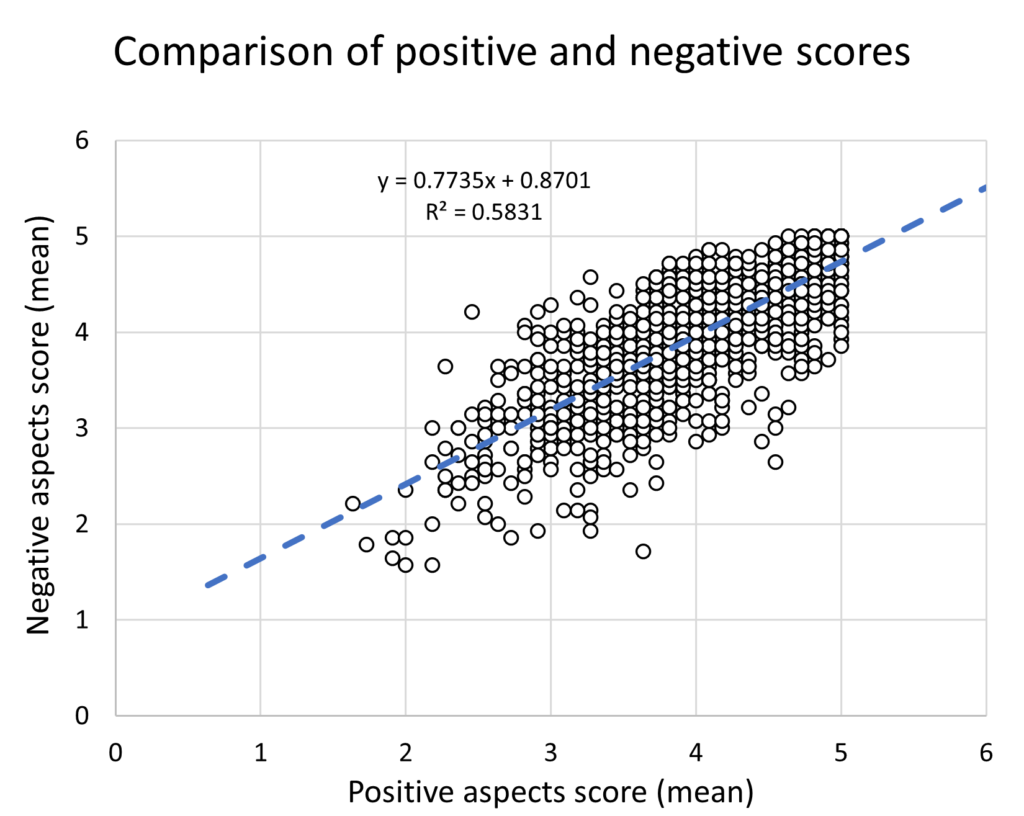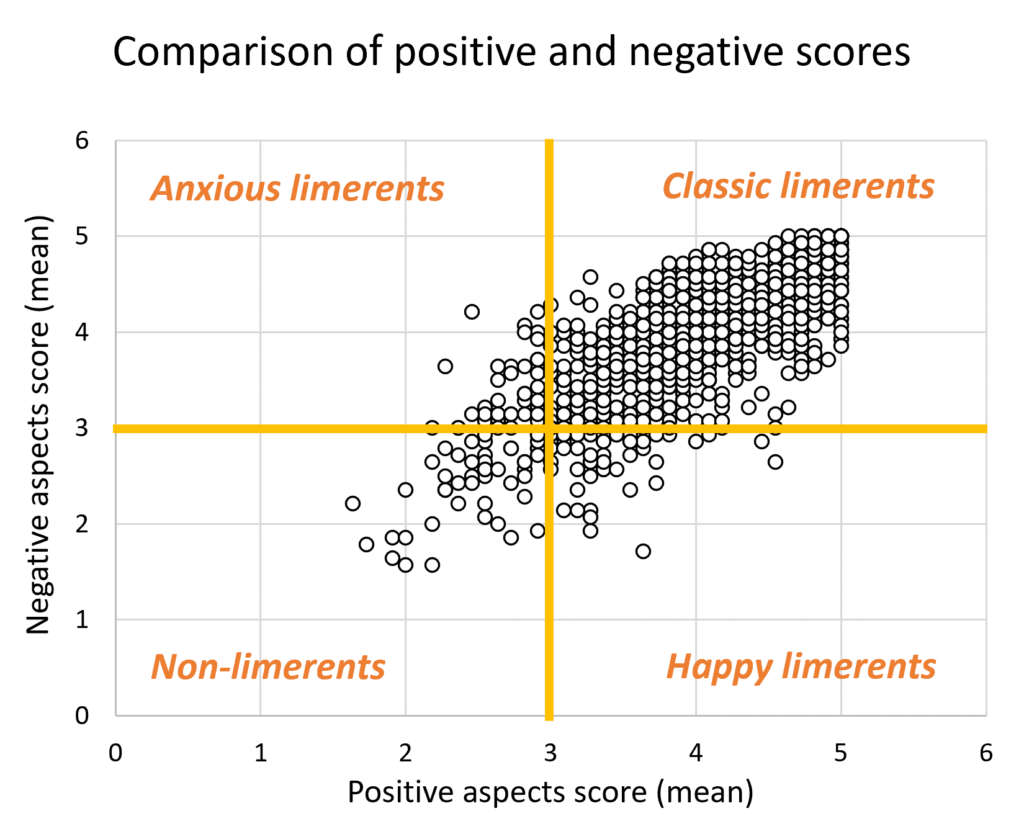A few weeks ago, I published a limerence quiz, designed to give people a quick and easy way to assess whether or not they fit the “limerent” personality profile when it comes to falling in love.
We’ve now had over a thousand people complete the quiz, so that gives us some data to work with!

The quiz was based around Tennov’s original set of symptoms, supplemented with some additional ideas devised and refined by the LwL community. I also had the additional goal of trying to use the data to better understand limerence, by looking for clusters and correlations that might show up something interesting about which experiences are very common among limerents and which are a bit more unusual.
We can start with a data dump on some of the key outcomes, with a quick reminder of the assessment method. The quiz scores 25 questions on a Likert scale – that is, each question is rated from “Strongly disagree” to “Strongly agree”. By converting that scale into a numbered score, we can do some stats.
The range of results
Twenty one people out of a thousand scored 100% on the quiz. That means they strongly agree with all 25 statements about limerence. The lowest score was 15%, which is strongly disagreeing with almost all statements. That’s gratifying to see, because it means the quiz does have the ability to distinguish between limerents and non-limerents.
The average score for the entire group is 72%, but that of course includes everyone who is counted – it doesn’t mean that most people are “72% limerent”.
The most common score was 83%, which is probably a better measure of the “typical” score for someone who has found their way to this site and wants to see if they fit the limerence profile.
So, to go out on a simplification-limb a bit, the typical quiz taker (who is preselected to be investigating limerence and wanting to know about their own psychology) has an average score a little bit more than “Agree” for the full bank of questions.
What are the most interesting results?
The statement that was most consistently agreed with was:
“When they seem to like me, I feel exhilarated and “high”
The question least agreed with was:
“When I am anxious, I can calm myself by remembering a happy encounter with them
Closely followed by:
“I sometimes crave solitude so that I can spend time fantasising about them
Despite these statements scoring low on average, the commonest response for both of these questions was still “Agree”. That apparent contradiction can be explained by looking at the variance in responses – that is how inconsistent the answers given were for each question.
The most contentious statements are those that some people strongly agree with and others strongly disagree with. The most contentious was:
“I frequently and compulsively check their social media
…which I confess surprised me. I thought that social media is such a powerful and low-resistance temptation that almost everyone would succumb. Of course, it could be that some limerents don’t use social media much, or some LOs might not be active on it, or that limerents are worried about their browsing history revealing their secrets.
Perhaps this is a lesson in better formulating questions, or perhaps it’s a genuine but surprising result.
Next most contentious was:
“I sometimes neglect my responsibilities to get more contact with them
That seems a bit more understandable, as it is a step further along the addiction path that some people would be better able to resist.

Positive and negative aspects of limerence
When I designed the quiz, I consciously sorted the questions into two groupings that could broadly be defined as the positive and negative aspects of limerence. By “positive” I mean those experiences that are exciting, exhilarating, or otherwise pleasurable. The statements that could be associated with uplifted mood and feeling better about life. So, statements like:
“The whole world seems brighter and more colourful since I met them
(commonest answer = “Strongly agree”)
For the negative experiences, it was aspects of limerence that are debilitating, upsetting, or in some way damaging to mood. So, statements like:
“I sometimes cannot stop thinking about them, even if I want to
(commonest answer = “Strongly agree”)
I did this because I had a hypothesis that some people may experience only (or mainly) one of the two “poles” of limerence. I thought there may be some evidence of “happy limerents” who don’t really experience the negative symptoms of person addiction, and also some “anxious limerents” who mainly suffer pain and don’t even get much of the joy of an early period of giddy infatuation.
Turns out, I appear to be wrong. Here is a plot of every person who has taken the survey with their average positive score plotted against their average negative score.

Obviously this is a bit complicated to interpret, but there are a few key points.
First, if there was perfect congruence between experiencing positive and negative aspects of limerence, the plot would be a diagonal straight line that went through the origin (the 0,0 point on the axes). As it stands, there is a clear positive correlation here (especially by the standards of social sciences; R2 = 0.58 for the aficionados), indicating that the two aspects are linked.
Another way to break this dataset down is to sort people into categories. If we take the answer “Neutral” as the threshold for whether or not someone experiences a positive or negative aspect of limerence, we can split the graph into quadrants:

By this sorting mechanism, we can split people into classical limerents (82% of total), happy limerents (5%), anxious limerents (5%), and non-limerents (8%).
It’s easy enough to explain why we have low numbers of non-limerents and happy limerents (they won’t be actively seeking out this site!), but the low prevalence of anxious limerents suggests that my hypothesis is wrong. It does seem that the good and the bad go together for the vast majority of people.
What next?
Now, I can accept that normal people may not be as excited about this analytical stuff as me, but I am hoping to keep building on this data and clarifying exactly what limerence is and isn’t. In that spirit, there are obviously limitations to this survey, principally:
- Only people who have found this quiz by searching will be answering the questions
- The questions are somewhat subjectively written and categorised (e.g. is “I really want them to feel as intensely about me as I do about them” a positive or negative statement?)
The solution to issue 1 is to sample a much broader population at random about their experience of romance. That will take time and money. But, the solution to issue 2 is constantly seeking feedback and wisdom.
So, I’ll end once again with a call for any ideas or insights from people who have taken the quiz or have views on the questions asked.
Let’s keep polishing till it shines.

Wow, Dr. L, this is really cool! That insight you found (that the positive and negative aspects likely go hand in hand) is a really cool bit of insight to have come out of this. And if you plan to do future surveys, perhaps you could design it with that hypothesis in mind?
My one suggestion for improving the survey (and I had made this comment on the post about the survey) is to keep in mind that some people taking it may have experienced limerence in the past but are now not currently experiencing it. Or at least, (as is my case), may have overcome the most intense phase of limerence, but are still not completely “over” LO. When trying to answer the survey questions, I kept going back and forth between being unsure whether to answer according to my current state or according to my previous state when my limerence was at its worst.
Out of curiosity, do you have long-term plans of publishing results from this (or future) survey(s) outside this site? Like submit to a journal or publish in a book?
Thanks, T. Good points. The problem I had with the “immediacy” problem was that the construction of questions along the lines of “have you ever experienced the sensation of…” becomes repetitive and distracting, and moves away from the resonance of direct expression of the ideas.
But, I do agree it is a problem for people who are limerents, but not currently limerent.
As for publishing… if the tweaking improves things and I can partner with a social scientist (and ethics committee) then we could move from online quiz for fun, to well designed survey for research.
Fingers crossed that it can progress to that!
One possibility is, if you want to focus on only one stage of limerence for the survey, you can include some screening questions at the beginning to filter out the survey takers who are not at the stage you don’t want to include. The drawback is that this could reduce your sample size. But there could be a way to ascertain if the respondent had previously experienced limerence and you could instruct them to answer from the mindset of when they were in the throes of that LE. Of course it would require a little more sophisticated survey design software which can show the respondent different instructions based on their answers to the screening questions.
Another suggestion I thought of was to have screening criteria around people who have multiple small LEs versus rare major LEs. Could be a screening criteria, or maybe just something to split responses by to see if there is a difference between serial limerents and non-serial limerents.
I’m not sure how you would do this, but you may need to factor in what limerence phase someone is in. Someone who is in the early stages of limerence is likely to feel differently about the LO and their LE than someone who is in the ambivalent phase (maybe feeling anger and resentment about a dodgy or unavailable LO but still mired in the limerence), versus someone who is at the tail end of an LE and is in the “what was I thinking?” phase.
I totally agree about the phases, and in fact that’s why I suspected there could be limerents who only experience the “fun” early stage, or have a very short early stage that rapidly shifts into suffering phase.
As with T’s comment, there is difficulty in capturing a changing phenomenon with static questions…
So, if the Mean score was 72% and the Mode was 83%, what was the Median score?
My score was 53%. As I remember it, most of my answers were 2 or 4. As a straight numerical mean, I could also get the same value with 1s and 5s.
Aside from the score, there wasn’t any way to determine which flavor of limerent that you might be from your arbitrary labels. What criteria did you use for determining the labels?
Since neither 0 or 6 was an allowed answer on the quiz, why did you set the quadrant axes in the category graph at 3,3? It would seem the axes would be 2.5, 2.5.
Doing that would imply more Anxious and Classic limerents and fewer Non-limerents and Happy Limerents. To me that makes more intuitive sense.
I also have a few other questions that I’d be interested in:
1. Are you now in an LE? – Y, N. IDK
2. How many LEs have you had in your life? – 0, 1-2,3-4, 5+ [the groupings are arbitrary?
3. Thinking back, how old were you when you had your first LE? – <10, 10-19, 20-29, 30-39, 40-49, 50-59, 60-69, 70+
4. How old were you when you had your last or current LE? – same scale
5. Have you experienced any direct consequences from limerence, check all that apply:
a. Break of a relationship or marriage
b. Sanctioned or fired from work
c. Had legal action taken against you [e.g. restraining order filed against you]
d. Other: please specify
6. Have you experience any physical effects you think were brought on by limerence: – Y, N. If Y, please go to #7
7. What physical effects do you believe were brought on or made worse by limerence? Check all that apply
a. Anxiety
b. Depression
c. Weigh loss or weight gain
d. Insomnia
e. Irritability
f. Crying
g. Anger
h. Other: please specify
8. From whose perspective are you taking the test? – Self, SO, LO
9. Do you social media stalk your LO? – Y, N
10. If Y, how much? – Daily, weekly, monthly, greater than monthly.
11. Do you think you have a "prototype LO?" – Y, N, IDK
12, If yes, what is it? – memo/text field or common traits
13. Do you have specific "glimmer triggers?" – Y, N, IDK
14. What triggers you? Check all that apply
a. Hair
b. Eyes
c. Sense of humor
d. Common interest
e. Flirty
f. Find me interesting
g. Other, please specify
14. What is the duration of your typical LE? – 10 years
15. What was the length of your longest LE? – Same scale as above.
16. Have you ever had therapy for limerence? – Y, N, Been to therapy but limerence wasn’t the expressed reason
17. Was the therapist aware of limerence? – Y, N
18. Did the therapist provide you with a specific diagnosis (e.g., BPD, NPD, Co-dependence)- Y, N, IDK, If Y, please specify
19. Did you use the word “limerence” with your therapist? – Y, N
19. Would you describe the therapist as generally supportive or dismissive of you explanation?
20. Did the therapist or other medical professional recommend medication for your symptoms? – Y, N, If yes, please list the medications prescribed
21. Do you feel the medication helped you? – Y, N
22. On a scale of 1 being Made Things Worse, 3 being No Noticeable Change, and 5 being, Therapy Worked Miracles, how effective was therapy for you?
23. What is your gender identity? –
24. What is your age age: Same scale as #3
25. What is your level of education: < than US HS, US HS grad, university bachelors degree, masters degree, PhD or greater.
26. What is your profession?
I can think of more questions.
No, really? 😉
Lots of good ideas, LE. And, as your Qs tend to, there is a lot to potentially learn once people have been identified as “classic limerents” about other aspects of the experience. We could do a proper analysis of some of the common questions: who gets it, how long does it last, does it correlate with other psych traits, etc. etc.
As for the median, it was 79%
Dr. L,
“I can think of more questions.
No, really? 😉”
I was going to post the same thing. 🙂
Another aspect is whether the limerence was consummated. Did sex increase the limerence? If so, was it is a clandestine affair or was it a relationship that was out in the open? I have a feeling that an affair probably increased it — more longing, more not being able to have the person fully. Whereas the beginning of a relationship started the clock on the demise of the limerence. How long did it take the limerence to wane? I have always been curious as to how long limerence lasts if the limerent and the LO get together in a reciprocal, committed relationship. For me, it was a sift death of the limerence but I’m thinking that might be an outlier.
Limerent Emeritus and Marcia both have great questions to enhance a future survey.
For what it’s worth, I don’t social-media-stalk my LOs because I don’t use social media and neither does LO#2. My budding LO#3 may use it, I don’t know. Oh shoot, I kind of want to check. Maybe there is a picture of his eyes. I would love to see his eyes!
When I did this quiz my most prominent feeling was realization at the progress! Many questions were like “it would have been a strongly agree (5) but now it is neutral(3) or even disagree(2)”! Ofcourse many still were a 5… it is a sloooow progress. I got 56%
One thing that keeps derailing my coming out of LE is that my LO seems to get jealous when I display any closeness to another guy or praise them strongly. We both work together (LO is my boss) so feedback and evaluating talent is part of work. And we work in teams, collaboration is a part of work too. So closeness to other guys & gals is purely friendship, sibling-banter kind of fun. I’m not being flirty or anything.
He is not a narcissist so the jealousy dies not come from that. He is actually a really sweet, well-liked person. While he’s been a good leader & an advocate for me I’m pretty certain he has no interest in me as a woman. So why does he get jealous then?
The part of me that I want to eviscerate (LE in my brain), rises up from dead with hope when that happens. Ugh.
Dr L, you should write a case study of LOs that get jealous when you show interest in someone else 🙄.. and thereby derail your recovery!
Sorry Blue Ivy,
But it sounds like he enjoys keeping you on the hook.
What does he get from it? And what business is it of his who you pal around with?
… He gets jealous when you praise other men in what way? They’re physique? Their humour? Their work output?
… And how do you know he’s jealous? How does it play out?
How do you feel when he expresses jealousy?
It certainly sounds similar to what I would expect of a narcissist… And it’s having the desired effect of preventing you focusing on potential alternative interests, romantic or otherwise that might distract from mooning after him.
Not all narcissists look alike.
https://livingwithlimerence.com/narcissist-los/
I’ve met them in a few flavours.
Hence, my unrequested opprobrium. Recently smarting after the return (and abrupt departure) of an LO… just when I thought I was off the hook, too.
Good luck!
“He gets jealous when you praise other men in what way?”
Purely work. Output… behaviours… normal assessment… he seems to get annoyed – withdrawing for me & getting critical of them. It is subtle but unmistakable. I’ve learnt to calibrate my positive feedback (for other GUYS only) in more measured words.
Thanks for the link Thomas. Good blog post.
I genuinely don’t think he is a narcissist. I suppose jealousy is a natural reaction & does not mean anything. It does fan the flames of my LE with hope tho’.
I don’t really know where to start with my personal story. If it were a film people would say it’s totally unbelievable. I had a long term affair with one of my wife’s friends. There I’ve said it. It was both emotional and physical. She gaslighted both my wife and I, using childhood trauma, the early death of a good friend. Anything she could find.
After Christmas this year we had a chance to finally be together, this is when the emotional pressure was ramped up. She told some terrible lies about her ex husband, so I’m getting the “she needs me more than my wife and family”
So on the evening of march 23rd this year I finally broke and told my wife of 16 years, that I loved her friend and wanted to go to her.
I expected her to throw me out because my AP made me think she didn’t love me. But over the next two hours we chatted and we decided to fight for our marriage.
Now what happened enter limerence… for about 6 weeks I was totally under her spell, I nearly left 3 times, but my wife knew that this person I’d turned into wasn’t me, wasn’t the man she married. I totally broke her, but her love for me was total. I’ve had no contact since 16th April with my AP this is so important, my mind is starting to return slowly, I see little bits of light through the darkness. The man I am is fighting back!
I have started therapy and that’s helping, my dear wife has also started therapy too.
Our whole live nearly exploded, luckily our children haven’t found out.
I was a fool and I’m not using limerence as an excuse but since Christmas I felt I was totally under her spell, nothing else mattered. Not Even my family. This hurts me greatly.
My limerence has gone down a level and I’m hopeful that It will continue to do so. It’s so hurtful to my wife.
But it was a great comfort when I actually found a name for what was happening to me, I thought I was having a breakdown, in some ways I have.
I feel this will chance my wife and I forever. Both the affair and limerence.
But this site has been a great help.
Thank you and be gentle!
Ohhhhhh! I LOVE it!!! Anything put into statistical terms is my kind of think! Thank you!
But now I would also love to know which quadrant I fall into
*thing